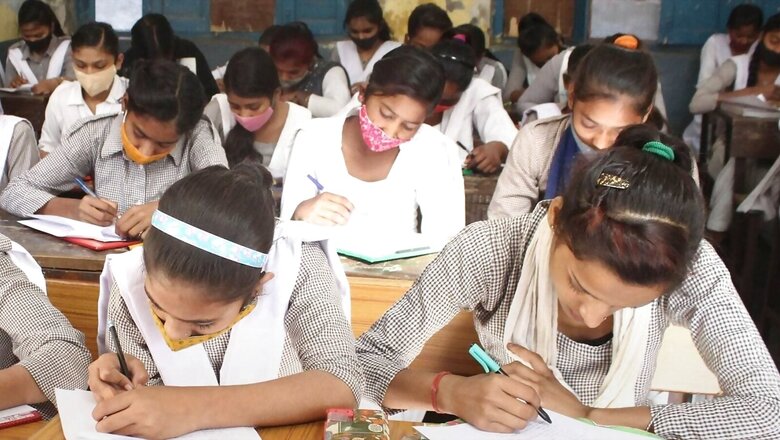
views
Students appearing for CBSE class 10 board examination 2023 tend to focus more on other mainstream subjects and English takes a backseat. They generally lack proper preparation for the English exam. However, as it is a global language spoken by many, it is an important language/subject and students must not ignore, thinking that it is a cakewalk.
Students must be thorough with the syllabus, exam pattern, concentrate more on NCERT books. They must know the complete syllabus, understand the exam pattern and marking scheme to strategize the preparation process before they initiate their preparation.
Also read| CBSE to Remove 10+2 Education Format, to Adopt New System From Next Academic Year
CBSE class 10 English language and literature, both have three sections — section-A (reading; 20 marks), section-B (writing and grammar, 20 marks), and section-C (literature, 40 marks). Apart from NCERT books, students must solve sample papers, build good vocabulary, and improve their writing skills.
Strategy to score better
Reading section: The first section aims to test the student’s ability to read and comprehend a passage as they answer questions related to the given passage. It is a scoring section and students must practice at least 1-2 passages daily. They must carefully read the given passage and understand it before answering the questions. Increasing the reading speed will help the students score better.
Writing and Grammar: The second section is set to test the candidate’s writing and grammar skills. As far as writing section is concerned, students must practice writing formal letters and analytical paragraphs. They must go through sample writings. For the grammar part, students require extensive practice for the questions based on editing, gap filling and narration. Communication in English will facilitate students improve their grammar.
Literature section: To score good in the third section, students must read thoroughly and memorize all the chapters and poems in their books and their corresponding authors and the poets. The literature section has four questions, including long answer type. Students must attempt previous papers and sample tests and try to frame and present long answers properly. With regular and consistent practice, they can do well in this section.
Read | CBSE 10th Board Exams 2023: Important Topics to Writing Strategy, How to get Full Marks in Mathematics
Section-wise weightage according to CBSE board exam
Section A:
Reading comprehension through unseen passage:
1. Discursive passage of 400-450 words — 20 marks.
2. Case-based passage (with visual input- statistical data, chart etc, of 200-250 words – 10 marks. The total length of two passages to be 600-700 words.
3. Multiple choice questions / objective type questions to assess inference, analysis, interpretation, evaluation and vocabulary – 10 marks.
Section B:
Grammar – 10 marks
— Tenses
— Modals
— Subject – verb concord
— Reported speech
— Determiners
Accurate use of spelling, punctuation and grammar in context will be assessed through gap filling, editing, transformation exercises. As many as 10 out of 12 questions will have to be attempted.
Creative Writing Skills – 10 marks
This section will have short as well as long writing tasks including compositions.
1. Formal letter based on a given situation in 100-120 words — 5 marks.
2. Writing an analytical paragraph (100-120 words) on a given map / chart / graph. One out of two questions is to be answered — 5 marks.
Section C:
Reference to the context (40 marks)
1. One extract out of two from drama / prose.
2. One extract out of two from poetry. (5+5 = 10 marks)
3. Multiple choice questions / objective type questions will be asked to assess inference, analysis, interpretation, evaluation and vocabulary.
4. Short and very long answer questions – 30 marks
— Four out of five short (Answer type questions in 40-50 words from the book )
— First flight — 4×3=12 marks
(Two out of Three Short Answer Type Questions to be answered in 40-50 words each)
— Footprints without feet — 2×3=6 marks
(One out of two Long Answer Type Questions from FIRST FLIGHT to be answered in about 100-120)
— Words each to assess creativity, imagination, and extrapolation beyond the text and across the texts. This can be a passage-based question taken from a situation/plot from the texts. (6 marks)
— One out of two long answer type questions from Footprints Without Feet on theme or plot involving interpretation, extrapolation beyond the text, and inference or character sketch to be answered in about 100-120 words. (6 marks)
Important topics:
— Letter to editor
— Complaint letters
— Placement of order
— Enquiry letters
— Narration (grammar)
Students ought to remember that English cannot be studied or mastered in a day. They must practice and revise regularly by reading, listening, writing, and speaking. Write out every answer and anything you read or learn to memorize better, understand what mistakes you are making, and try to improve. Students must solve previous years sample papers and time themselves to do better in the exam.
— Written by Alka Kapur, Principal, Modern Public School, Shalimar Bagh
Read all the Latest Education News here



















Comments
0 comment